Pharmacare closed; owner indicted for fraud
PoPville reports that Pharmacare, the pharmacy at Florida and Georgia Avenues has closed permanently after its owner was indicted for fraud.
The U.S. Attorney alleges that the owners of the Pharmacare and several affiliated pharmacies in Maryland and Pennsylvania billed $2.6 million to Medicare and Medicaid for prescriptions they never actually refilled. A sign posted on Pharmacare’s door says the store has closed as of August 2.
UNCF and restaurants open at the Shaw Metro
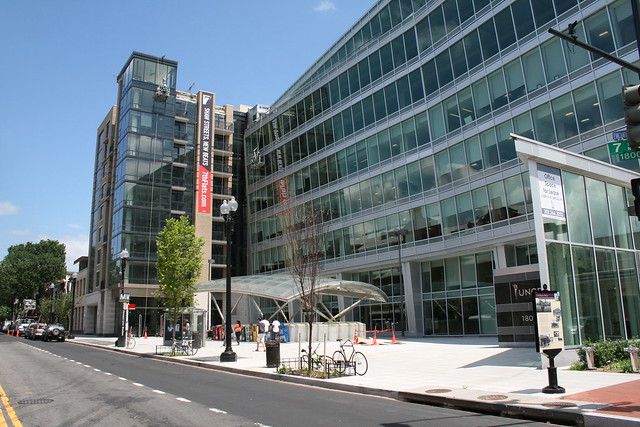
The much-anticipated Progression Place, the development at the Shaw Metro is nearing completion. The United Negro College Fund (UNCF) moved into the office building back in October, purchasing half of the 100,000 square feet of office space. There is no word yet on who the other office tenants will be.
Not your father’s sherry
The retail spaces are opening up, with sherry bar Mockingbird Hill (1843 7th St NW) taking the lead on June 7th. Mockingbird Hill is the brainchild of mixologist Derek Brown, his mixologist wife Chantal Tseng, and business partner Angie Salame. Mr. Brown also owns The Passenger and The Columbia Room on 7th Street opposite the Convention Center. Ms. Tseng comes to Mockingbird Hill from the Tabard Inn, where she ran the bar.
Mr. Brown and Ms. Tseng are the powerhouse couple in the DC cocktail scene. The husband and wife duo is determined to introduce a sherry craze in the District. The bar features over 50 types of sherry and offers several types of carved ham. Mockingbird Hill is inspired by the ham and sherry bars of Spain, but the interior exposes brick and hangs vintage filament bulbs like many of the hip bars around town.
Can Mr. Brown and Ms. Tseng sell enough sherry to people other than British retirees to stay in business? Only time will tell, but the husband and wife team is also planning two adjacent ventures, including an oyster bar delightfully named Eat the Rich, slated to open at 1839 7th Street next month. Chesapeake Bay oysters were once abundant and cheap, making 19th century Washington a hotbed of oyster restaurants.
Another business is brewing
Around the corner at 624 T Street, Nathan Zeender, John Snedden, and Thor Cheston are fitting out the former Cafe Manowaj space to open the Right Proper brewpub. The microbrewery will serve Belgian-style ales and sour beers and allow customers to carry out their beers in growlers.
We will update you as we hear about more retail tenants opening in the building. Until then, admire Right Proper’s storefront copperwork.
The war between the states comes to 6th & Florida

The Bohemian margarita is a specialty of Bistro Bohem.
The City Paper reports that Bistro Bohem‘s mixologist (cocktail chef), Mark Reyburn, has defected across 6th Street to Shaw’s Tavern. Reyburn intends to infuse Shaw’s menu with Civil War-era cocktails befitting the venue’s namesake.
Considering that Bohem’s cocktails were exceptionally good when I reviewed the place in May, Reyburn’s new grog gig is sure to please.
The City Paper also notes that Shaw’s plans to add a roofdeck within two months. I have come to learn, however, that these build-outs typically take longer than even the most ambitious restaurateurs expect.
But even with Shaw’s salvo of a new cocktail list and roofdeck, Bohem isn’t ready to surrender so easily. Bohem is planning a Reconstruction of its own, in fact. The Bohem dominion is expanding into the space next door that used to be Zee’s Restaurant. The new Cafe Bohem will open on September 3 and will serve coffee and pastries.
Google Streetview goes inside shops on U Street
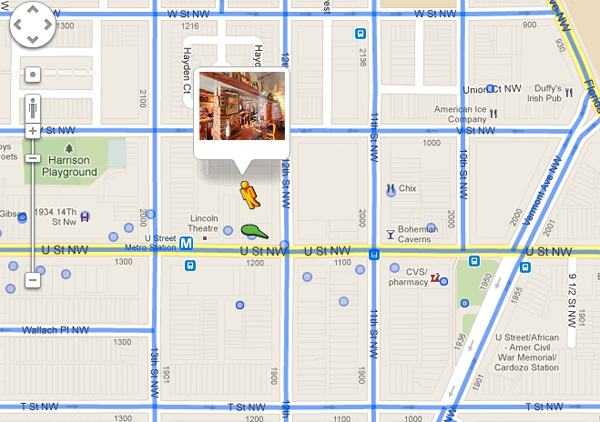
Back in 2009 we noted that Google had updated all its streetview photos of LeDroit Park. What we didn’t notice is that Google for some time now has been adding panoramic photos of the interiors of local businesses.
Drag the little streetview man to U Street, for instance, and you’ll notice two types of blue dots. The darker blue dots are user-contributed photos. The lighter dots, however, give you tours inside the buildings.
Google has covered a good deal of U Street and 14th Street. The closest venue to LeDroit Park is Wazobia at T and Wiltberger Streets. You can even “walk around” these establishment and pan and zoom the images.
Here are a few notable places near LeDroit Park and along U Street:
- Wanda’s Hair Salon – 1851 7th Street (Wanda’s has moved)
- Greg’s Barber Shop – 1909 7th Street – (old-timey cash register to boot!)
- Nellie’s – 900 U Street – (blown-up print of Nellie Storrs Newman behind the bar)
- Dickson Wine Bar – 903 U Street
- Zula Ethiopian Restaurant – 1933 9th Street
- Lounge of Three – 1013 U Street NW – (Sign reads, “Music we play may cause severe neck injury.”)
- 9:30 Club – 815 V Street NW
- Ben’s Chilli Bown – 1213 U Street NW – (Sign famously notes that only the Obamas and Bill Cosby eat for free)
City grants license for All Souls, slams opponents
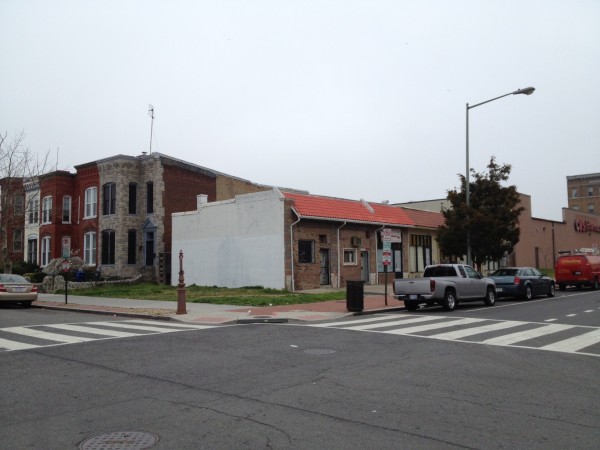
The Alcoholic Beverage Control (ABC) Board will grant a license for All Souls, the proposed restaurant to occupy the long-vacant storefront at 725 T Street. All Souls became a lightning rod for unexpected opposition in March, drawing crowds and TV news coverage to its liquor license hearing. The objections covered the usual grounds: too much noise late into the night, too many drivers looking for parking, too many chances for general disorder.
The proprietor had long before agreed to only serve alcohol inside and only serve after 5 pm.
The most unusual objection, however, was that it is harmful for children to look across the street and view adults consuming alcohol. The objection seemed like a quaint, Puritanical reaction incongruent with a diverse, secular city.
DC law does, however, recognize that alcohol-serving establishments near schools merit at least some level of extra scrutiny. In fact the law prohibits the issuance of liquor licenses
within 400 feet of a public, private, or parochial primary, elementary, or high school; college or university; or recreation area operated by the District of Columbia Department of Parks and Recreation (DC Code §25-314(b)(1)).
The protestors, legally referred to as “protestants”, thought this provision would damn the All Souls application. The same section of the DC Code, however, lists 10 exceptions to the 400-foot rule, including this important one:
The 400-foot restriction shall not apply if there exists within 400 feet a currently-functioning establishment holding a license of the same class at the time that the new application is submitted. (DC Code §25-314(b)(3))
The board found that the Mesobe market in the orange building at 1853 7th Street NW is indeed already within 400 feet of the school. The distance measurement, the board’s ruling stated, “‘shall be the shortest distance between the property lines of the places.’ 23 DCMR §101.1 (West Supp. 2012).”
The existence of Mesobe within 400 feet of the school provides a precedent that satisfies the exception for All Souls, the board decided.
With that argument down, the board addressed the general assertion that it is unsafe for children to view adults consuming alcohol. Here is where the board delivered its most scathing criticism of the objectors:
Finally, we reject the Protestants’ unsubstantiated assertion that the mere sight of the Applicant’s tavern will be detrimental to the students of Cleveland Elementary School… Indeed, if we accepted the Protestants’ argument that the mere sight of adults in a tavern consuming alcohol is harmful to children, the Board would similarly have to ban children from:
- entering restaurants that serve alcohol to patrons;
- attending sporting events where alcohol may be consumed by adult fans;
- eating dinner with their parents if wine is served with the parents’ meal;
- participating in religious ceremonies where wine is part of the service; and
- walking through neighborhoods with large concentrations of liquor-serving establishments during the daytime, such as Adams Morgan and U Street.
The board further described the objection as “unworkable, unreasonable, and not in accordance with current societal practices.”
There are a few important lessons from this case. The most important is that District boards don’t always cave to the flimsily argued demands of a vocal few. A common complaint, especially among the business community, is that DC’s various boards, such as Zoning Commission, the Board of Zoning Adjustment, the Historic Preservation Review Board (HPRB), the Old Georgetown Board, the ABC Board, etc., exercise their discretion in ways that are too often inconsistent or outright bizarre.
The most frustrating experience with these boards is encountering unsupported opinions. In cases before the HPRB, many opponents argue that a proposed building is “incompatible” with the historic district while they fail to elaborate why it is allegedly incompatible. Georgetown resident Topher Matthews explained this sentiment that I have also encountered when following historic preservation cases:
Time and time again, neighbors use the historic preservation design review process to object to the size of the project rarely out of any genuine concern for the preservation of the neighborhood’s historic character but rather because they simply just don’t like the project. The basis for the complaints would be no different than if the project were in a brand new development with no historic character: it blocks my view, it’s too big, you’ll be able to see into my garden, et cetera.
In the All Souls case, the school proximity argument failed to establish harm to students to a degree that would warrant killing off a local business. It is a non sequitur to many people that children are harmed by catching a glimpse of adults across the street sipping wine at 5 pm. Merely believing that something is true doesn’t necessarily make it true. In rejecting this claim, the ABC Board made the right decision.
The entire licensing process, which was unusually protracted in this case, certainly cost the proprietor of All Souls a hefty sum in legal fees. When the proprietor attended community meetings on his proposed license, he usually had his attorney with him to address the fine legal distinctions, especially as it applied to the somewhat complicated 400-foot rule.
In fact I pitied the man. All he wanted to do was open up his small businesses. His modest license request unleashed the histrionic vitriol of a few strident Furies who spoke as though he were defiling the sanctity of childhood itself!
The board ratified a voluntary agreement between All Souls and three neighbors uninvolved in the school-proximity protest. The text of this side agreement is not currently available, but if it is like most other voluntary agreements, it likely negotiated closing hours and restrictions on indoor music volume, not moral arguments about child psychology and societal vice.
The good news is that even the school-proximity opponents who lost their case actually won. Cleveland Elementary School is a great school and will continue to be a great school long after All Souls has poured its inaugural beer. The conversion of the vacant storefront into an occupied business will deter the loitering and drug dealing along that block of T Street and will remove a visible physical blight from the neighborhood.
The neighborhood and the school will both be better off once All Souls opens.
Will Florida Avenue become the next U Street?
When perusing the excellent interactive DC zoning map, one thing stands out around LeDroit Park: all the properties fronting Florida Avenue are zoned to permit both residential and commercial uses. Even the rowhouses on the LeDroit side of Florida Avenue can be turned into restaurants, offices, or shops without any need for special zoning approval.*
We mention this not to alarm anyone, but to educate residents about the influence of zoning ordinances. Zoning is the invisible geography that quietly shapes the use and form of the built environment.
The north-side rowhouses on the 400, 500, and 600 blocks of Florida Avenue were clearly built as homes. About 100 years ago, many of these rowhouses hosted the offices of Washington’s prominent black doctors.
Neighborhoods change and businesses move and nearly all the rowhouses on our stretch of Florida Avenue reverted to their original uses as residences. Even the notable Harrison’s Cafe at 455 Florida Avenue is a residence with much of its former retail bay window bricked in.
A few businesses still dot Florida Avenue. While Shaw’s Tavern and Bistro Bohem are reviving the corner of Florida Avenue and 6th Street, they occupy buildings that are clearly commercial in form. Thai X-ing, however, has been located for several years in and old rowhouse at 515 Florida Avenue NW. Though it looks like an abberation, Thai X-ing may just be ahead of its time.
The properties fronting Florida Avenue are zoned C-2-A, which permits as a matter of right,
office employment centers, shopping centers, medium-bulk mixed use centers, and housing to a maximum lot occupancy of 60% for residential use and 100% for all other uses, a maximum FAR of 2.5 for residential use and 1.5 FAR for other permitted uses, and a maximum height of fifty (50) feet. Rear yard requirements are fifteen (15) feet; one family detached dwellings and one family semi-detached dwellings side yard requirements are eight (8) feet.
There is no need to worry about an old rowhhouse being torn down and turned into office blocks. First, the houses along the LeDroit Park side of Florida Avenue are within the historic district. Historic preservation laws prevent drastic alterations, especially alterations to such an cohesive section of architecture.
Second, the C-2-A zone is a low-density zone, permitting a floor-area ratio (FAR) of only 1.5 for non-residential uses. Most of the existing rowhouses already exceed 1.5 FAR since they were built before the current zoning code.
The opening and success of Shaw’s Tavern and Bistro Bohem demonstrate business success along our stretch of Florida Avenue. There is clearly a demand for commercial activity near LeDroit Park and we were happy to spend Sunday afternoon revisiting Bistro Bohem. Whether this demand translates into rowhouse conversions into restaurants and bars remains to be seen. Even still, don’t be surprised if Thai X-ing gets a few restaurant, pub, cafe, or boutique neighbors in the coming years.
* Though one may open a restaurant without special approval in a commercial zone, a restaurateur must still follow the usual process for obtaining a license to serve alcohol.
Bistro Bohem expands outside and inside
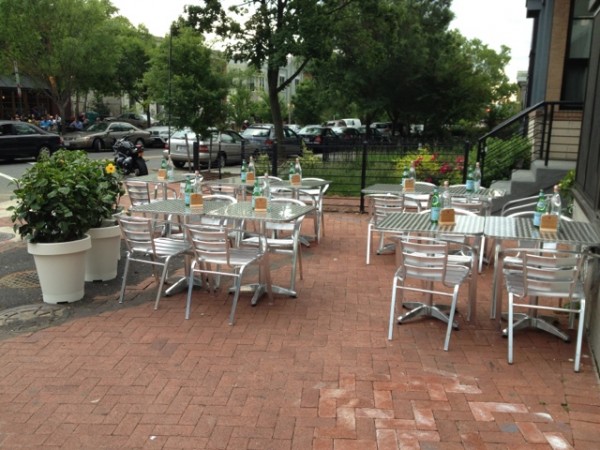
Our own bistro du coin
With the opening of Bistro Bohem, the corner of Florida Avenue and 6th Street is turning into a tiny culinary colony along Florida Avenue. Bohem’s popularity scuttled our plans for our first visit. It was 9 pm and we walked over looking to try it out. It was packed and there was a waiting list for both the tables and for the bar. All this on a Tuesday night!
After just a few weeks of operation, though, the restaurant is expanding into the old retail space that contained Zee’s, the Trinidadian restaurant that only lasted a few months. A sign on the window christens the space “Café Bohém”. On the 6th Street front, Bohem has added much-needed outdoor seating. We can imagine sitting there, sipping Bohem’s signature Bohemian margarita and watching the passersby. Many LeDroit Park and Bloomingdale residents walk by this intersection on their way to and from the Metro. On our visit, we spotted several neighbors returning from work.

Bohemian Margarita
The Bohemian margarita, by the way, was the best item we enjoyed on our recent visit to the restaurant. It’s not nearly as sweet as a regular margarita and benefits from the distinct taste of gin.
While the drink was noteworthy, the food needed some work. It wasn’t bad, but it wasn’t amazing either. Bohem offers a variety of “small plates” derived from the cuisine of Eastern Europe. The lightly browned mushrooms were served with a delicious garlic paprika aioli, but the mushrooms themselves suffered from being, well, mushrooms.

Lightly Browned Mushrooms
Mushrooms can be difficult to cook. They absorb water like sponges, resisting your best effort to dehydrate or saute them. Though the mushrooms were coated in breadcrumbs and fried, they were still disappointingly watery inside.
A popular dish is the pierogi, a typical eastern European dumpling stuffed with a potato cheese filling. Bohem garnishes the dish with caramelized onions.

Pierogis, one of Bistro Bohem's most popular dishes.
We hope it was a coincidence, but the pierogi dish contained a watery sauce, as evidenced by the photo. It’s decent, but like any pierogi dish, is simple in taste and perhaps better suited to snaking or breakfast. The caramelized onions were very… caramelized.
Tom Sietsema at the Post reviewed Bohem and recommends the chicken schnitzel, which he says “races ahead of the pack.” We will certainly try it on our next visit.
If you’re headed out for a serious meal, Shaw’s Tavern might be a better bet, but if you’re self-medicating the symptoms of a unpleasant job, Bistro Bohem’s drink menu will do the trick.
A moratorium will stifle new restaurants and lower service
We recently received a petition to oppose a liquor license moratorium for the U Street area. We weren’t sure why the petition came up, but it seems there is yet another movement afoot to establish a liquor license moratorium (and thus a restaurant moratorium) on U Street. The moratorium’s backer is a resident on 13th Street and she proposes the moratorium for all new liquor license applications within a 1,800-foot radius of Ben’s Next Door.
We wrote about this matter two years ago when Jim Graham floated the idea. Nonetheless, it’s worth revisiting why this moratorium is a bad idea:
It makes no distinction between responsible businesses and rowdy businesses.
A moratorium fails to differentiate between businesses that are quiet and cause no trouble for their neighbors, e.g. the Saloon, and those that cause raucous noise late into the night. ANCs and neighbors should protest irresponsible and disruptive businesses, but a moratorium is essentially a permanent, unconditional protest of all proposed restaurants and bars. Many new establishments are started by experienced restaurateurs whose previous businesses exist in harmony with their neighbors.
It’s effectively a restaurant moratorium.
Restaurants make their money on alcohol and relatively little on food. This is why Shaw’s Tavern, when dry, quickly shuttered. Prohibiting the issuance of new liquor licenses will essentially deny new restaurants the ability to earn enough to pay rent. A liquor license moratorium is a restaurant moratorium.
It will reduce customer service.
A moratorium will limit the supply of restaurants and bars even while demand rises. This means restaurant prices will face upward pressure, seating may become scarcer, and service quality will likely fall. The population of the census tract covering the eastern side of the U Street corridor grew by 86% from 2000 to 2010 and will continue to grow as more residential buildings come online. If you think finding a table is hard now, a moratorium will make it worse.
It unfairly “picks winners”.
Placing a legislative cap on new business activity unfairly privileges incumbent businesses. To intervene so severely in the market as to artificially limit consumer choice means that current license holders will enjoy an oligopoly. This increased business, however, will not result from a restaurant’s merit, but will result from the fact that consumers will face limited choices. A business owner’s “merit” will simply be that he had the good luck open shop just before the regulatory door slammed shut behind him.
It’s arbitrary.
There are currently 107 licenses within the proposed moratorium area. There is no definitive proof that the 107 number is too high, too low, or just right. Unfortunately, moratoria disregard nuance and set arbitrary numbers as permanent limits.
Furthermore, it’s arbitrary to propose that the moratorium be based on a perfect circle, that the circle have a 1,800-foot radius, and that the circle be centered on Ben’s Next Door.
It will not resolve the stated problem.
Matters of crime, noise, and trash, which the City Paper reports as the main motivators for the moratorium’s proponent, will not be resolved by a moratorium. Restricting the issuance of alcohol licenses will not reduce crime, will not reduce noise, and will not reduce trash. It will, however, result in longer wait times for table, higher prices, and lower service.
It’s difficult to administer.
Laws should be simple to understand and administer. The proposed moratorium area is a circle and circles are harder to measure on land. In fact, we discovered this problem recently when measuring the distance between a liquor store and Cleveland Elementary School. Do you measure by the edge of the property line or by the edge or the building? Certainly we have the technology today to determine this distance, but it takes time and skill to do it accurately. The technical challenge is a hurdle for business owners and citizens alike to understand the impact of the law. A listing of city blocks would be far easier to decipher and would cause less confusion than a circle.
* * *
Instead of swinging a legal sledgehammer to stop all future restaurants, good and bad, we should judge each application on its own merit. Restaurateurs who have proven records of being good neighbors should by all means receive licenses and less reputable restaurateurs should be denied. We urge you to sign the petition to oppose the moratorium.
Injured driver crashes into Shaw’s Tavern
We got news this morning that a man had been found stabbed on the 500 block of Florida Avenue NW near Shaw’s Tavern. The story turned out to be a bit more complicated. A man driving a BMW crashed into the Florida Avenue side of Shaw’s Tavern early this morning. When police arrived, they found the driver with a stab wound in his neck. He was taken to Howard University Hospital where he later died.
The details are unclear at this point, but the driver may have been stabbed elsewhere and may have been trying to drive himself to the hospital for treatment.
Here’s the Fox 5 news report from early this morning.
This is not the first significant crash near 6th and Florida. In 2006, a drunk driver crashed into 605 Florida Avenue, destroying much of the house’s brick turret.
Shaw’s Tavern dry no more
Shaw’s Tavern finally got its alcohol license approved and will open tonight for dinner. For this weekend they are only serving beer and wine.
If you’re curious, you might want to read our recent review of Shaw’s or see what the building looked like in 1937.
Here are the new hours:
Kitchen:
Monday – Thursday: Lunch 10am-3pm, Dinner 5pm-10pm
Friday: Lunch10am-3pm, Dinner 5pm-11am
Saturday: Brunch 9am- 3pm, Dinner 5pm-11pm
Sunday: Brunch 9am-3pm, Dinner 5pm-10pm
Bar:
Monday- Thursday: 10:00am-12:30am
Friday: 10:00am-2:30am
Saturday: 9:00am-2:30am
Sunday: 9am-12:00am

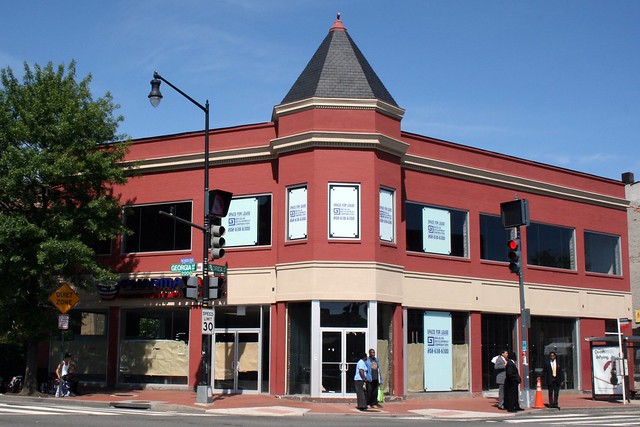
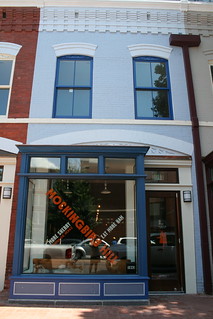
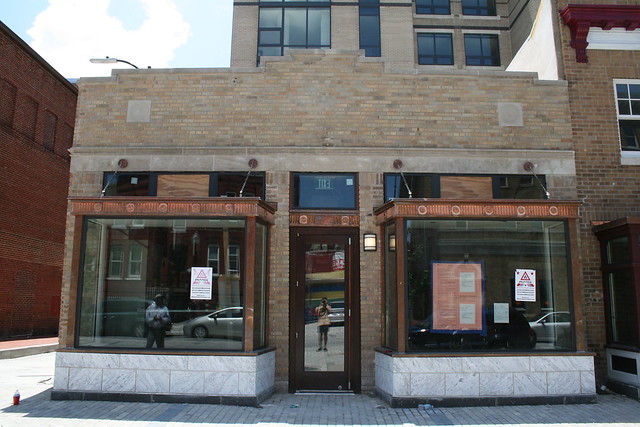
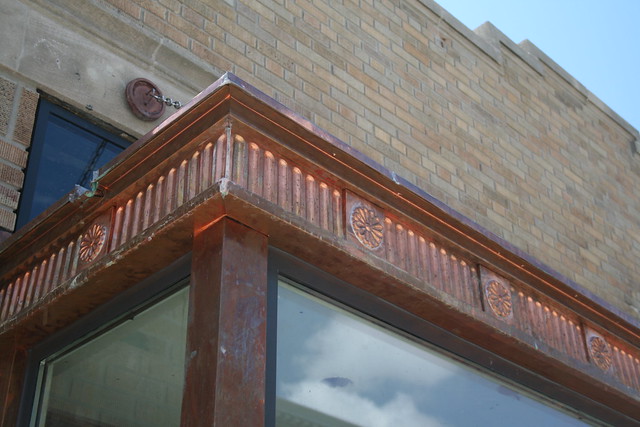
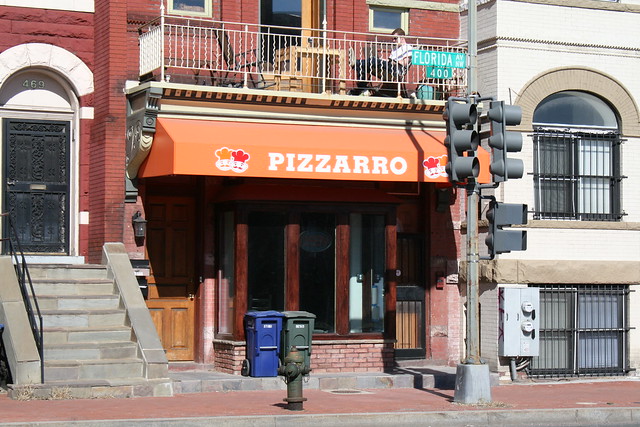

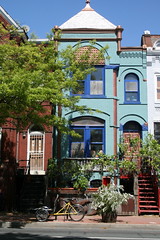
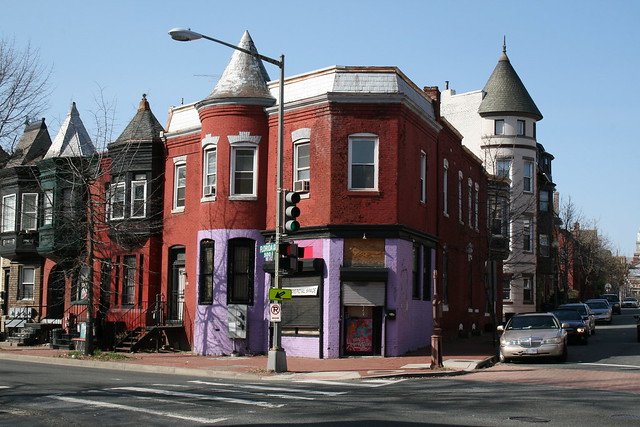
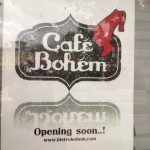
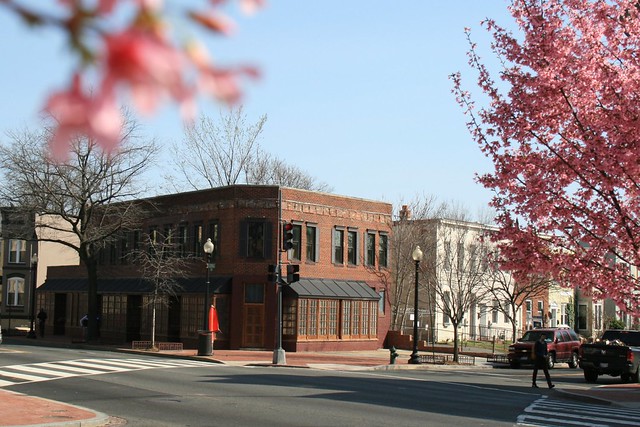






Recent Comments